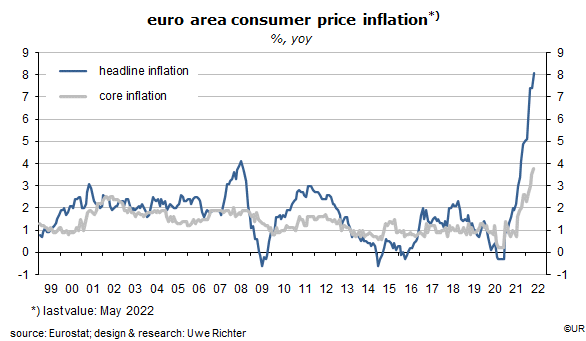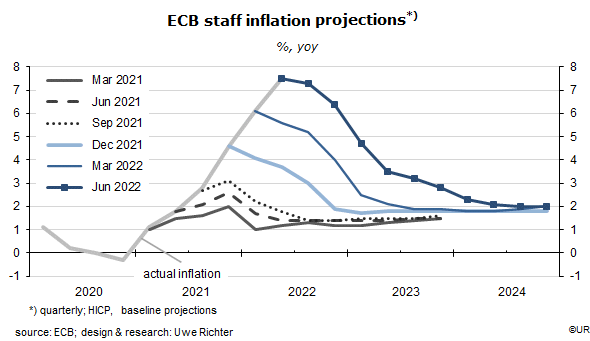
Market Commentary: Green monetary policy less of a priority
Dieter Wermuth, Economist and Partner at Wermuth Asset Management
For about one year now, the issue of greening monetary policies has gradually lost the public’s attention. Compared to what has recently happened to European consumer prices, and what should be done to fight runaway inflation, the focus on what the ECB should do for the climate looks rather irrelevant.

The Treaty about the operation of the EU states that the ECB has the mandate to provide price stability. In addition, the central bank shall support the other economic policies of the EU as long as this does not come at the expense of price stability. Seen from the ECB, climate protection is therefore a secondary goal. In political terms it means that the ECB should support “green” banks and other “green” institutions more than the rest, by subsidizing their lending and buying their fixed-income securities. It is a kind of structural or industrial policy mandate on top of the core mandate which is to provide price and financial stability.
It is not at all clear who will determine what is green, or not. For instance, should EDF, the giant French utility which generates about 90% of its electricity from nuclear power, be regarded as a green company and thus worthy of ECB support while Volkswagen AG which is a bad guy from a climate perspective but works hard to go from combustion engines to fully electric is not? Should a central bank like the ECB make such a decision? For me, there are specialized institutions which are better equipped for this, such as ministries for the environment or rating agencies.
Green monetary policies are a side show at a time when price stability is so much out of reach as today. The most recent rate of euro area core inflation has been 3.8% y/y while inflation expectations one year ahead are also at around 4% and thus significantly above the ECB target of 2%. There had been ominous inflation numbers from Germany yesterday: seasonally adjusted, May industrial producer prices were 1.6% m/m and no less than 33.5% y/y; core, ie, ex-energy they were 1.1% and 16.2%. Inflation mentality is spreading, it seems.
This means that the ECB must single-mindedly focus on slowing inflation in order to preserve its credibility which has been significantly damaged by the recent series of overly optimistic inflation forecasts.

The ECB had obviously no clue how those high inflation rates had come about. The bank cannot be held responsible for supply shocks – these cannot easily be predicted, and cannot be reversed by monetary policies. The reaction at the moment is to slow down the growth of euro area demand for goods and services by tightening policies, but at a very moderate pace, hoping to avoid a recession. Economists at UniCredit, a bank, predict that the main policy rate will increase by 175 basis points between now and spring 2023 – inflation-adjusted it will remain in negative territory, if by less than today. In other words, the ECB will maintain its expansionary stance.
In all of this, green monetary policy will play a negligible role. It does not amount to much, either way, and may make a comeback once things have normalized again. It can rest assured that it is on the right track, as central banks in England, China and Japan have turned green as well. Others will follow.
###
For more information please contact:
Instinctif Partners
Lars Hofer
E lars.hofer@instinctif.com
T +49 162 562 8917
Visit us: https://wermutham.com/
Follow us on Twitter and LinkedIn
About Wermuth Asset Management
Wermuth Asset Management (WAM) is a Family Office which also acts as a BAFIN-regulated investment consultant.
The company specializes in climate impact investments across all asset classes, with a focus on EU “exponential organizations” as defined by Singularity University, i.e., companies which solve a major problem of humanity profitably and can grow exponentially. Through private equity, listed assets, infrastructure and real assets, the company invests through its own funds and third-party funds. WAM adheres to the UN Principles of Responsible Investing (UNPRI) and UN Compact and is a member of the Institutional Investor Group on Climate Change (IIGCC), the Global Impact Investing Network (GIIN) and the Divest-Invest Movement.
Jochen Wermuth founded WAM in 1999. He is a German climate impact investor who served on the steering committee of “Europeans for Divest Invest”. As of June 2017, he was also a member of the investment strategy committee for the EUR 24 billion German Sovereign Wealth Fund (KENFO).
Legal Disclaimer
The information contained in this document is for informational purposes only and does not constitute investment advice. The opinions and valuations contained in this document are subject to change and reflect the viewpoint of Wermuth Asset Management in the current economic environment. No liability is assumed for the accuracy and completeness of the information. Past performance is not a reliable indication of current or future developments. The financial instruments mentioned are for illustrative purposes only and should not be construed as a direct offer or investment recommendation or advice. The securities listed have been selected from the universe of securities covered by the portfolio managers to assist the reader in better understanding the issues presented and do not necessarily form part of any portfolio or constitute recommendations by the portfolio managers. There is no guarantee that forecasts will occur.
Read the full article in PDF format here: English.